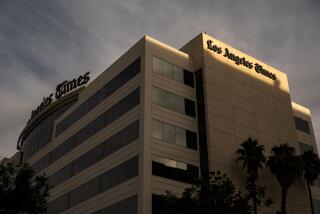THE EDITOR’S DUTY
- Share via
Willie Morris’s recollections of the turbulent end of his editorship at Harper’s Magazine (Book Review, “New York Days,” Sept. 5) are not the only way to explain what happened.
At that time I’d been reading Harper’s for many years. I’d depended on it, rather I’d depended on its editors, to present me with a broad range of stimulating reading material based on their much better access to many sources than I could possibly have. Harper’s was, and other still are, (the Atlantic, for instance), a means to avoid the tendency to read narrowly in what comes in the normal course of professional life.
Viewed this way, the decision to give a whole issue over to Norman Mailer was simply irresponsible and self-indulgent. Besides, any essay so massive was unnecessary. It was preaching to the converted. Vietnam was certainly an important topic but by no means the only one worth reading about that month. So the editor breached his duty to the readers. That is why he was fired. It doesn’t matter what an editor may think, or what position he may take, the editor’s duty is not to compromise the fundamental mission of the journal.
If you don’t believe this in the abstract, try it concretely. Try devoting a full month--four issues--of the Los Angeles Times Book Review to just one literary essay, to the exclusion of all else. You’ll be out on the street, and your readers, like those of Harper’s who were voting with their feet on Willie Morris’ editorial operations long before the Mailer essay, would celebrate your departure. Freedom of speech issue? Ridiculous! It’s a matter of journalistic responsibility.
IRWIN B. MARGILOFF
DUARTE
More to Read
Sign up for our Book Club newsletter
Get the latest news, events and more from the Los Angeles Times Book Club, and help us get L.A. reading and talking.
You may occasionally receive promotional content from the Los Angeles Times.








